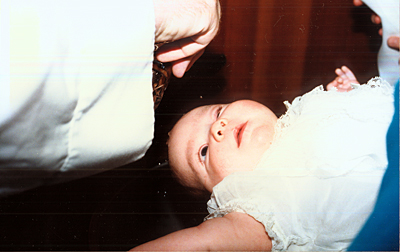
 As the first of the seven sacraments, baptism is the one that opens the door to a life of faith in the church.
As the first of the seven sacraments, baptism is the one that opens the door to a life of faith in the church.
Pastors in the Diocese of Charleston encourage parents to take baptism as the serious commitment to follow Jesus that it is meant to be instead of being something they think they are supposed to do.
“It’s not just something you do because you want God to look kindly on your child. It’s the beginning of Catholic life,” Msgr. Joseph H. Hanley said. “Baptism is the foundation for everything that happens from then on.”
Christ himself set the precedent when he was baptized in the Jordan River by John the Baptist.
After his resurrection, Jesus commanded his apostles to make disciples in all nations, baptizing them in the name of the Father, the Son and the Holy Spirit, (Mt. 28:19-20).
It is through baptism that all sins are forgiven.
Msgr. Hanley, pastor of Blessed Sacrament Church in Charleston, said Catholics must be baptized before they can receive confirmation, first communion, get married or attend the seminary.
“You can go to church, but you can’t participate in the life of the church without baptism,” he stressed.
Who can be baptized?
The simple answer is anyone who believes in Jesus. Of course, a person can’t simply walk into church and ask to be baptized. There are requirements to be met, and vows to be made.
Men and women who choose to be baptized for the first time must have a sponsor and attend the Rite of Christian Initiation for Adults classes, said Msgr. Chester M. Moczydlowski, pastor of St. Benedict Church in Mount Pleasant.
Children over the age of seven who have not been baptized attend age-appropriate catechism classes, he said.
Parents, baptismal sponsors, extended family and friends must promise to raise the child in the church and according to the tenets of the faith, Msgr. Hanley said.
Baptism of babies
When Christianity was illegal, proclaiming one’s faith required great sacrifice and baptism was exclusively for adults, said Father Jay Scott Newman, pastor of St. Mary in Greenville.
By the fourth century, Christianity had been declared legal and the baptism of babies became the statistical norm, he said. However, he added that it requires the same beliefs as the sacrament for adults.
“Infant baptism is meaningless apart from the living faith of the parents and the godparents,” Father Newman said. “If it isn’t a sacrament of faith, it’s just superstition, it’s magic.”
Promises made on behalf of the child cannot be false promises, he said, adding that it is a pastor’s moral duty to make sure parents are going to uphold their obligations.
Msgr. Moczydlowski said canon law does not allow denial of baptism, but priests can delay it if they feel parents can’t meet their promises. Since all pastors are different, requirements will vary from church to church.
At St. Mary, parents who have not been active in the church are required to attend Mass for six months to relearn the catechism and grow in understanding of the Gospel, Father Newman said.
Msgr. Joseph Hanley meets with each couple before baptism. During the period of instruction, issues such as marriage outside the church are raised. He explains the steps that can lead to marriage being recognized by the church and offers to assist them in the process.
At St. Benedict, Msgr. Moczydlowski said he looks at many factors.
“There has to be a reasonable assurance that the parents will bring up their children in the faith,” he said. “Normally we would opt in favor of baptism if one of the parents was brought up in the church, but kind of fell to the wayside.”
If the parents’ attendance at church is iffy, he said he will also take the grandparents’ role into consideration.
However, if the parents or other legal guardian are opposed to baptism, no other relative or friend has the right to have the baby baptized, the monsignor added.
What about godparents?
At least one of the godparents, or baptismal sponsors as they are more correctly called, must be a practicing Catholic, Msgr. Moczydlowski said. If there is more than one sponsor, the other can be of a Protestant faith as long as that person is in good standing with their church.
The gender of the sponsor is not an issue, nor is the number of sponsors a child may have. The monsignor said he has attended baptisms with as many as six godparents present.
Father Newman said parents must choose sponsors who are involved with the church, and problems can arise if a sister wants her brother to be a godparent even though he isn’t a practicing Catholic.
The role of a godparent is not a social honor, he said, it is a moral obligation.
Baptism and salvation
According to the Catechism of the Catholic Church, a person must be baptized to achieve salvation. This is because baptism is the first and chief sacrament of forgiveness of sins and unites one with Christ, who died for our sins and rose for our justification.
The dunking of the baptized person in water, or pouring water over the head, signifies immersion into the death of Christ and rising with him as a new creature, which is required for salvation.
The catechism does provide for a few exceptions, including those who have died for the faith, catechumens, and those who seek God and strive to do his will even though they do not know God or the church.
Children who die without baptism are entrusted to the mercy of God.
Father Newman encouraged each person to mark the date of their baptism and keep that day as an annual feast of their conversion to Jesus Christ.
